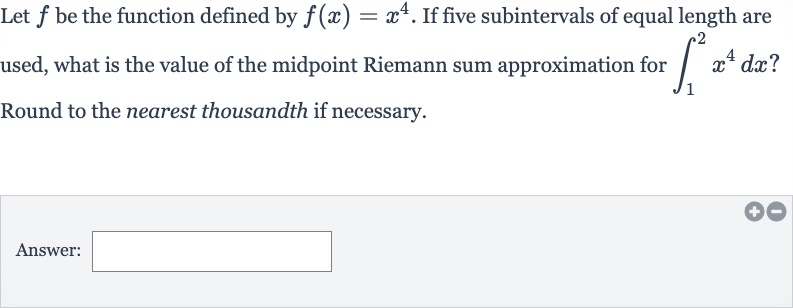AI tutor
Welcome to Bytelearn!
Let’s check out your problem:

Let be the function defined by . If five subintervals of equal length are used, what is the value of the midpoint Riemann sum approximation for ? Round to the nearest thousandth if necessary.Answer:
Full solution
Q. Let be the function defined by . If five subintervals of equal length are used, what is the value of the midpoint Riemann sum approximation for ? Round to the nearest thousandth if necessary.Answer:
- Calculate Width of Subintervals: To calculate the midpoint Riemann sum, we first need to determine the width of each subinterval. The interval has a length of . Since we are using five subintervals, the width of each subinterval is .
- Find Midpoints of Subintervals: Next, we need to find the midpoints of each subinterval. The midpoints will be used to evaluate the function . The midpoints are found by adding half of the width of a subinterval to the lower endpoint of each subinterval.
- Evaluate Function at Midpoints: The midpoints for the five subintervals are as follows:
- Perform Function Calculations: Now we evaluate the function at each midpoint:
- Calculate Riemann Sum: Perform the calculations for each :
- Substitute Values into Formula: The midpoint Riemann sum approximation is the sum of the function values at the midpoints multiplied by the width of the subintervals ():
Riemann sum = - Calculate Riemann Sum: Substitute the values we have calculated into the Riemann sum formula:Riemann sum =
- Round Riemann Sum: Calculate the Riemann sum:Riemann sum = Riemann sum =
- Round Riemann Sum: Calculate the Riemann sum:Riemann sum = Riemann sum = Round the Riemann sum to the nearest thousandth:Riemann sum
